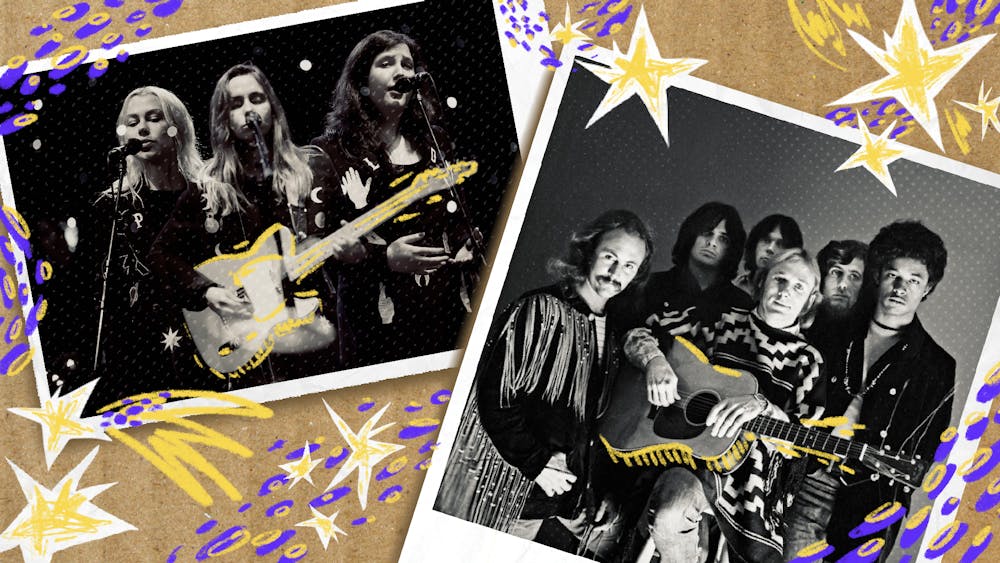When I was 16, I burned my first CD. Rapt to undergo this rite of passage that my fangirl predecessors all experienced, I impatiently sat on the cold wooden floor of my room while Billy Corgan and Mitski smiled down on me with encouragement from my wall. I had no doubt in my mind what would be my first CD: the unattainable self–titled EP by boygenius. I longed to possess that part of “Me and My Dog,” where Phoebe belts accompanied by Lucy's perfect harmony while Julien shreds the guitar: “I dream about it.” Admittedly, I account for half the streams of boygenius’ performance at Brooklyn Steel Pitchfork Live on Nov. 7, 2018. Since then, Julien Baker, Phoebe Bridgers, and Lucy Dacus have earned stardom in their own right as individual artists. Critically acclaimed and adored by cult followings, boygenius is the definition of the famed supergroups of the 20th century.
The term supergroup refers to successful bands formed by already established musicians. Searching for the “best supergroups of all time” page upon page brings up influential rock bands with common links between them: male rock stars whose self–importance fuels and is fueled by their success. Thus, these special types of bands inevitably “often fail to go beyond a single album, and why long–lasting ones … had drama that never seemed to end,” Rolling Stone observed. What would Eric Clapton’s legacy be without his supergroups, Cream and Blind Faith? Pattie Boyd’s other lover George Harrison also formed his own supergroup, Traveling Wilburys, consisting of Bob Dylan, Roy Orbison, Jeff Lynne, and Tom Petty.
Indie artists with a small overlapping following, the formation of boygenius was nothing short of the name. The trio met when Dacus and Bridgers both opened for Baker in 2017. Bridgers and Dacus later reunited backstage at a Philadelphia festival. “We're all in very similar places in our career … we’ve done a lot of opening slots,” Bridgers told Newsweek, “We know what it's like to be talked down to because you're young or a woman.” The members of boygenius quickly became friends, from their shared love of the word “bro,” to their “longform email catch–up thing.”
boygenius’ name is a quip at the plague that is men in the music industry. “We were just talking about boys and men we know who’ve been told that they are geniuses since they could hear, basically and what type of creative work comes out of that upbringing,” Dacus told The New York Times. As opposed to these tortured male musicians, working with all women on their EP was creatively fulfilling, juxtaposing the usual fated end to supergroups. Audioslave is one of many that broke up due to "irresolvable personality conflicts as well as musical differences." In boygenius, there is no front person. “We all felt more comfortable because we understand each other, because of our age and our careers, but also being women,” said Baker, “The way we talk to each other is not with an inflation of ego or with a false persona of harshness, or some sort of weird bravado that does pollute interactions, even unknowingly, with dudes.”
boygenius hasn’t released anything since their EP, as they are all busy touring their respective wildly successful albums. But we don’t know the end for the band. “Since that band started, our plans have been like, ‘Whenever it’s easy and fun.’ I’m sure we will … we’re just meeting up whenever we can,” Bridgers told Billboard this past February. Oftentimes, the artists guest appear at each other’s concerts, singing backup to “Graceland Too” and “I Know the End” from Bridgers’ Punisher. Listen closely to “Favor” from Baker’s Little Oblivions, and ''Please Stay” from Dacus’ Home Video, and you’ll hear the boys back together again. boygenius even reunited to perform for the first time in three years on Nov. 19, 2021, for the Bay Area nonprofit Bread & Roses.
Is the supergroup dead? Maybe in the sense that we are used to. Even in the EP cover, an allusion to Crosby, Stills & Nash self–titled album cover, boygenius is subverting audience’s expectations of the usual supergroup. Supergroups have evolved from the predominant male rock groups we remember. Male rockstar–based supergroups will be phased out when they stop going on their 30th final tour. Female and queer artists are redefining male–dominated spaces, one of those being the supergroup. As Dacus says, “You want people to not miss [the fact that the EP is made entirely by women], but you also don’t want people to linger on it. We just wanted people to see that it’s possible and easy to do.”







